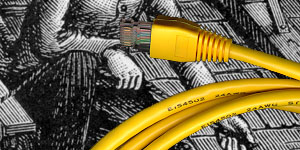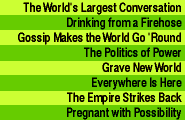


Drinking from a Firehose
Computers can let us create and interact with a vast sea of electronic information. In the future, every person, business, and government in all advanced countries may have available vast stores of electronic information---some public, some private. By then information will have become the blood and sinews of society.Even now, the information ocean everyone swims in is so vast that no one can hope to find anything without markers and directions. Eventually we might have to assign all information nodes fixed locations, perhaps on a vast grid. Each node might then appear as a unique object everyone can recognize while ambling around the electronic landscape. For some, navigating through the information ocean might be like driving a car and using landmarks for directions. Others won't bother to do the navigating themselves but will have their electronic helpers do it.
Eventually, each node might be created by hundreds, thousands, perhaps millions, of computers, all working together to maintain a particular information base and to provide the fixed visual form of it that passersby can easily identify---like the store signs and neon billboards of today.
A primitive version of that electronic information ocean is forming today. Like liquid mercury poured onto a plate, present-day computers are rapidly pooling into vast communication networks spanning the globe. The people using those coalescing computers all talk to each other, producing a blizzard of electronic mail messages every day---an estimated six thousand million in 1992 alone.
In 1994 roughly a thousand million people around the world, almost a sixth of the world's population, watched the American Superbowl. Another thousand million watched the Academy Awards that year. People from Japan to Mexico to Holland regularly watch American movies in English. We're becoming the global village Marshall McLuhan predicted several decades ago.
Yet, while many of us watch television broadcasts today, few of us can produce those broadcasts. What might it be like when a thousand million of us can communicate with each other directly---without the need of filters like radio shows, newspapers, magazines, or television? If computer prices keep falling yearly (very likely), and if computer networks keep doubling yearly (very unlikely), we might be able to do this in under fifteen years. Hundreds of millions of us in advanced countries might carry around cheap, robust computers that can talk directly to the worldwide network of computers. Millions of people already carry pagers; they could easily become portable electronic mail creators instead of simple message accepters. All we have to do is add a small keyboard, or wait for cheap computers to improve enough to understand more of our speech and handwriting.
Soon, if we choose to, any one of us could tell the entire world what we think about anything, anytime, anywhere---not simply by voice transmission (as in most of today's telephones) but also as home movies, call-in talk shows, and personalized newspapers. There are already a few video cameras linked to the net providing a daily feed of various remote locations---a coffee machine, an aquarium, a park, an office. Thousands of people watch these nearly unchanging scenes from around the world; these spectators are kin to those who squatted in front of early television sets, endlessly waiting for the first broadcast. Nothing stops anyone from putting on a show---or reporting the news---in front of one of these cameras. Eventually, they could even charge admission. What might it be like to live in a world with the equivalent of a hundred million unregulated television stations?
Who needs CNN when fifty ordinary people at a riot can uplink what they see as it happens? How might that affect repressive governments wishing to control their populations? What might it do to little old ladies walking the night streets armed with satellite cameras?
Making everything electronic---numbers, words, pictures, sounds, maybe one day even smells and tastes---is like inventing currency exchange rates. Nowadays, sound is rapidly turned into electronic pulses. Soon sight, then perhaps pressure, heat, and even taste and smell will follow. All are merely different ways to transmit information and can be coded electronically. All can be exchanged. Free currency exchange led to the world economy; what will free electronic exchange lead to?
Once something can be exchanged easily, large masses of it can collect in various places. And large masses of anything---a river of water, a barrel of money, an army of people, an ocean of information---can be used to do previously impossible things. A country's space program, for example, simply couldn't exist without a liquid monetary system that lets us pool vast resources. What might today's pooling of information make possible tomorrow?
The potential social changes in ideas of community and identity, allegiance and cohesion, are---literally---incredible. What will be the effects of tomorrow's communication technology on today's entertainment industry? Or global politics, for that matter? Could instabilities in one country eventually come to be mirrored instantly in another? Are we headed for a world of instant global rioting? What would it be like to throw a party and have half a million people come?